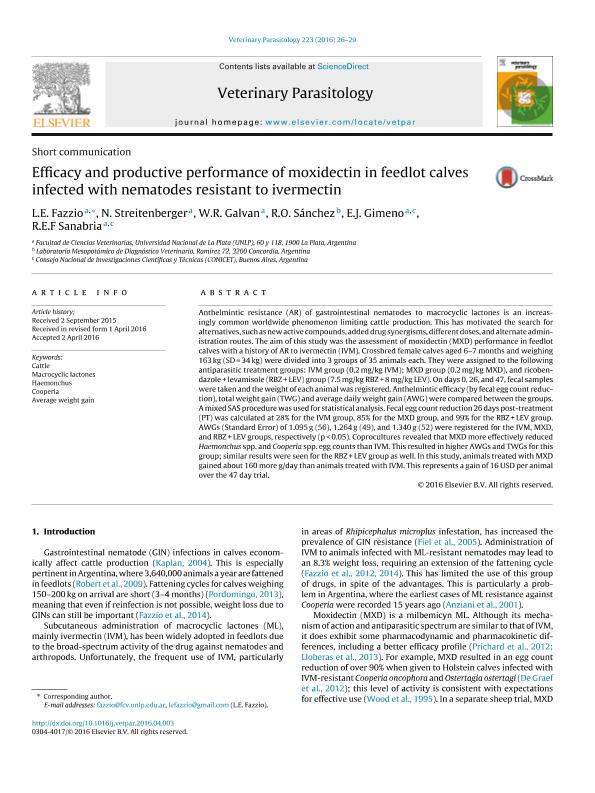Mostrar el registro sencillo del ítem
dc.contributor.author
Fazzio, Luis Emilio

dc.contributor.author
Streitenberger, Nicolás

dc.contributor.author
Galvan, Walter Ruben

dc.contributor.author
Sánchez, R. O.
dc.contributor.author
Gimeno, Eduardo Juan

dc.contributor.author
Sanabria, Rodrigo Eduardo Fabrizio

dc.date.available
2018-08-08T15:32:17Z
dc.date.issued
2016-06
dc.identifier.citation
Fazzio, Luis Emilio; Streitenberger, Nicolás; Galvan, Walter Ruben; Sánchez, R. O.; Gimeno, Eduardo Juan; et al.; Efficacy and productive performance of moxidectin in feedlot calves infected with nematodes resistant to ivermectin; Elsevier Science; Veterinary Parasitology; 223; 6-2016; 26-29
dc.identifier.issn
0304-4017
dc.identifier.uri
http://hdl.handle.net/11336/54562
dc.description.abstract
Anthelmintic resistance (AR) of gastrointestinal nematodes to macrocyclic lactones is an increasingly common worldwide phenomenon limiting cattle production. This has motivated the search for alternatives, such as new active compounds, added drug synergisms, different doses, and alternate administration routes. The aim of this study was the assessment of moxidectin (MXD) performance in feedlot calves with a history of AR to ivermectin (IVM). Crossbred female calves aged 6-7 months and weighing 163 kg (SD = 34 kg) were divided into 3 groups of 35 animals each. They were assigned to the following antiparasitic treatment groups: IVM group (0.2 mg/kg IVM); MXD group (0.2 mg/kg MXD), and ricobendazole + levamisole (RBZ + LEV) group (7.5 mg/kg RBZ + 8 mg/kg LEV). On days 0, 26, and 47, fecal samples were taken and the weight of each animal was registered. Anthelmintic efficacy (by fecal egg count reduction), total weight gain (TWG) and average daily weight gain (AWG) were compared between the groups. A mixed SAS procedure was used for statistical analysis. Fecal egg count reduction 26 days post-treatment (PT) was calculated at 28% for the IVM group, 85% for the MXD group, and 99% for the RBZ + LEV group. AWGs (Standard Error) of 1.095 g (56), 1.264 g (49), and 1.340 g (52) were registered for the IVM, MXD, and RBZ + LEV groups, respectively (p < 0.05). Coprocultures revealed that MXD more effectively reduced Haemonchus spp. and Cooperia spp. egg counts than IVM. This resulted in higher AWGs and TWGs for this group; similar results were seen for the RBZ + LEV group as well. In this study, animals treated with MXD gained about 160 more g/day than animals treated with IVM. This represents a gain of 16 USD per animal over the 47 day trial.
dc.format
application/pdf
dc.language.iso
eng
dc.publisher
Elsevier Science

dc.rights
info:eu-repo/semantics/openAccess
dc.rights.uri
https://creativecommons.org/licenses/by-nc-sa/2.5/ar/
dc.subject
Average Weight Gain
dc.subject
Cattle
dc.subject
Cooperia
dc.subject
Haemonchus
dc.subject
Macrocyclic Lactones
dc.subject.classification
Otras Ciencias Veterinarias

dc.subject.classification
Ciencias Veterinarias

dc.subject.classification
CIENCIAS AGRÍCOLAS

dc.title
Efficacy and productive performance of moxidectin in feedlot calves infected with nematodes resistant to ivermectin
dc.type
info:eu-repo/semantics/article
dc.type
info:ar-repo/semantics/artículo
dc.type
info:eu-repo/semantics/publishedVersion
dc.date.updated
2018-08-08T15:01:46Z
dc.journal.volume
223
dc.journal.pagination
26-29
dc.journal.pais
Países Bajos

dc.journal.ciudad
Amsterdam
dc.description.fil
Fil: Fazzio, Luis Emilio. Universidad Nacional de La Plata. Facultad de Ciencias Veterinarias; Argentina
dc.description.fil
Fil: Streitenberger, Nicolás. Universidad Nacional de La Plata. Facultad de Ciencias Veterinarias; Argentina
dc.description.fil
Fil: Galvan, Walter Ruben. Universidad Nacional de La Plata. Facultad de Ciencias Veterinarias; Argentina
dc.description.fil
Fil: Sánchez, R. O.. Laboratorio Mesopotámico de Diagnóstico Veterinario; Argentina
dc.description.fil
Fil: Gimeno, Eduardo Juan. Consejo Nacional de Investigaciones Científicas y Técnicas; Argentina. Universidad Nacional de La Plata. Facultad de Ciencias Veterinarias; Argentina
dc.description.fil
Fil: Sanabria, Rodrigo Eduardo Fabrizio. Consejo Nacional de Investigaciones Científicas y Técnicas; Argentina. Universidad Nacional de La Plata. Facultad de Ciencias Veterinarias; Argentina
dc.journal.title
Veterinary Parasitology

dc.relation.alternativeid
info:eu-repo/semantics/altIdentifier/doi/https://dx.doi.org/10.1016/j.vetpar.2016.04.003
dc.relation.alternativeid
info:eu-repo/semantics/altIdentifier/url/https://www.sciencedirect.com/science/article/pii/S0304401716300826
Archivos asociados
